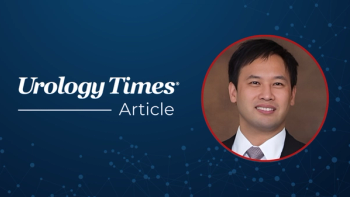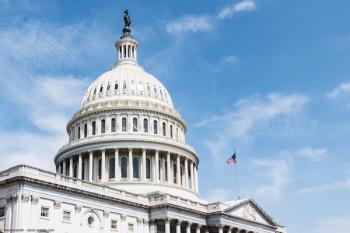
- Vol. 47 No. 3
- Volume 47
- Issue 3
AUA forms PAC to pursue policy goals
With a long list of legislative priorities set for 2019, the AUA has established the AUA Political Action Committee to which members can contribute to help advance the association’s advocacy efforts in Washington.
With a long list of legislative priorities set for 2019, the AUA has established the AUA Political Action Committee
Explaining the purpose of the PAC, AUA President Robert C. Flanigan, MD, said: “AUAPAC helps AUA participate in the political process to advance the specialty of urology and enhance the care of the patients we serve.”
Members’ contributions to AUAPAC will be used to support candidates for the House and Senate, including incumbents, who support the association’s positions and goals with respect to key legislative issues.
Also by Bob Gatty:
Tom Rechtschaffen, MD, chair of the AUA Legislative Affairs Committee, said the new PAC will provide both clinical and academic practice urologists, researchers, allied providers, and others a platform to support candidates and policies impacting urology. A PAC board, comprised of urologists and other leaders with an interest in urology, will guide the nonpartisan AUAPAC, which will follow specific principles and criteria in determining recipients of political contributions.
The AUA previously participated in
So AACU took over UROPAC on its own, he said. “But a lot of urologists (who are not AACU members) are excited about legislative affairs and they didn’t really have a place to donate and have their concerns addressed. So, we tried to make sure every urologist is represented. This is why AUAPAC came into existence,” Dr. Rechtschaffen said.
Next:
Dr. Rechtschaffen said there has been a “big turnover” in the AUA’s legislative priorities this year, largely because so many previous goals from previous years have been achieved.
Read:
Chief among those successes was repeal of the Independent Payment Advisory Board (IPAB), which was included in President Obama’s Affordable Care Act. The plan for IPAB, which was to be a 15-member commission, was to make it easier for Congress to control Medicare spending.
However, the AUA and the vast majority of organized medicine vehemently opposed IPAB, charging that it would take unilateral action to reduce Medicare reimbursement levels with little recourse for Congress to overturn its actions.
The big chance to finally get rid of IPAB, which never was actually launched, came during consideration of the Bipartisan Budget Act of 2018, which included IPAB repeal language. It was passed by large margins in both the House and Senate and signed into law by President Trump.
Now, the AUA’s priorities include efforts to:
- preserve access to appropriate PSA screening
- reform the U.S. Preventive Services Task Force recommendation process
- promote medical liability reform
- preserve the appropriate use of the in-office ancillary services exception to the Stark Law and work to remove barriers that prevent urologists from participating in value-based payment models
- address work force shortages in all urologic access practice environments, preserve access to appropriate and timely care, expand access to care with innovations including telemedicine, and advocate for increased graduate medical education funding and resources for urology positions
- reduce regulatory burdens (eg, MACRA implementation, prior authorizations, step therapy) and other issues that limit patient access to care, interfere with the physician-patient relationship, or cause physician burnout
- promote urology/cancer research funding
- advocate for the full continuum of care for prostate cancer survivorship
- ensure equitable infertility care for wounded warriors and veterans.
“AUA is still focusing on funding for graduate medical education,” said Dr. Rechtschaffen, who noted that the average age of urologists is the second oldest of any specialty.
“We need to replace those retiring and train more urologists,” he said. “That’s at the top of list. We are also pushing for research funding. The fact is that we cannot find new cures without appropriate funding, and AUAPAC will represent those in research positions who are concerned about this.”
Dr. Rechtschaffen said the AUA also is pushing for fertility benefits for veterans.
Also see:
“We found a disconnect between soldiers who fought for our country and were injured and their ability to access fertility treatment. The Veterans Administration has no mechanism to cover fertility treatment, so rectifying this is one of our major initiatives. We are pushing very hard on that.”
Next:
Regarding MACRA, he said, “We are all aware that the sustainable growth rate formula was replaced with the MACRA Quality Payment Program, which requires doctors to meet specific criteria for performance and certification for reimbursement. It is a very comprehensive system, and we need to advocate for transparency and simplification of the rules and fairness between specialists and primary care physicians.”
A constantly recurring priority for the AUA is medical liability reform.
“That is always near the top of our member surveys,” Dr. Rechtschaffen said.
These and other issues were included on the agenda of the
Read:
The conference includes speakers ranging from urologists to patients, government employees, and members of Congress. It provides opportunities for participants to meet with lawmakers and their staff and to meet with officials at various federal agencies.
Last year, the summit attracted more than 250 attendees, including physicians and health care professionals from all walks of life.
“The turnout was amazing,” said Dr. Rechtschaffen. “People saw their issues addressed and we got tremendous ratings, especially from the younger physicians who are under the AUA tent, but really don’t know yet what they’ll be doing. Both AACU and LUGPA have helped organize the event and participate in various sessions.
“The fact that all these groups participate make this event special,” Dr. Rechtschaffen observed. “It’s really the whole community, not just the AUA.”
Articles in this issue
almost 7 years ago
How the 2017 tax law will affect your filing this yearalmost 7 years ago
How to leverage industry relationships while avoiding risksNewsletter
Stay current with the latest urology news and practice-changing insights — sign up now for the essential updates every urologist needs.






